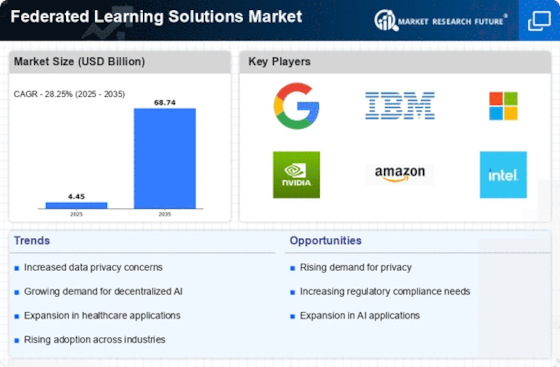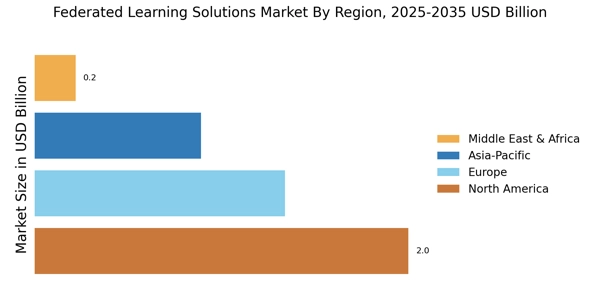Growing Adoption in Healthcare
The Federated Learning Solutions Market is witnessing a notable increase in adoption within the healthcare sector. Healthcare organizations are increasingly recognizing the potential of federated learning to facilitate collaborative research and improve patient outcomes while safeguarding sensitive patient data. By enabling multiple institutions to share insights without exposing individual patient records, federated learning fosters innovation in medical research and personalized medicine. The market for federated learning in healthcare is projected to grow significantly, with estimates indicating a potential market size of USD 500 million by 2027. This growth is driven by the need for secure data sharing and the increasing emphasis on patient privacy, making federated learning solutions an attractive option for healthcare providers.
Enhanced Data Security Measures
The Federated Learning Solutions Market is propelled by the growing emphasis on enhanced data security measures. As cyber threats become more sophisticated, organizations are compelled to adopt solutions that not only protect data but also allow for its utilization in analytics. Federated learning offers a unique approach by keeping data localized and only sharing model updates, thereby minimizing the risk of data breaches. This method is particularly appealing to industries such as finance and telecommunications, where data security is paramount. The increasing frequency of data breaches and the subsequent financial implications are likely to drive organizations towards federated learning solutions. The market is expected to witness a surge in investment, with projections indicating a market size of USD 1 billion by 2025.
Increasing Regulatory Compliance
The Federated Learning Solutions Market is experiencing a surge in demand due to the increasing need for regulatory compliance across various sectors. Governments and regulatory bodies are implementing stringent data protection laws, such as the General Data Protection Regulation (GDPR) and the California Consumer Privacy Act (CCPA). These regulations necessitate that organizations adopt solutions that ensure data privacy while still enabling data analysis. Federated learning, which allows for decentralized data processing, aligns well with these compliance requirements. As organizations strive to meet these legal obligations, the adoption of federated learning solutions is likely to grow, thereby driving the market forward. The market is projected to reach a valuation of approximately USD 1.5 billion by 2026, indicating a robust growth trajectory fueled by compliance needs.
Advancements in Artificial Intelligence
The Federated Learning Solutions Market is significantly influenced by advancements in artificial intelligence (AI) technologies. As AI continues to evolve, the need for efficient data processing methods that respect user privacy becomes paramount. Federated learning enables organizations to train AI models on decentralized data without compromising sensitive information. This capability is particularly appealing to sectors such as healthcare and finance, where data privacy is critical. The integration of federated learning with AI is expected to enhance model accuracy and performance while maintaining compliance with data protection regulations. As a result, the market for federated learning solutions is anticipated to expand, with estimates suggesting a compound annual growth rate (CAGR) of around 25% over the next five years.
Rising Demand for Collaborative Intelligence
The Federated Learning Solutions Market is experiencing a rising demand for collaborative intelligence among organizations. As businesses seek to leverage collective data insights without compromising individual data privacy, federated learning emerges as a viable solution. This approach allows organizations to collaborate on model training while keeping their data secure and private. Industries such as retail and manufacturing are particularly interested in this collaborative model, as it enables them to enhance predictive analytics and improve operational efficiency. The market for federated learning solutions is likely to expand as organizations recognize the value of shared intelligence. Estimates suggest that the market could reach USD 2 billion by 2028, driven by the increasing need for collaboration in data-driven decision-making.

















